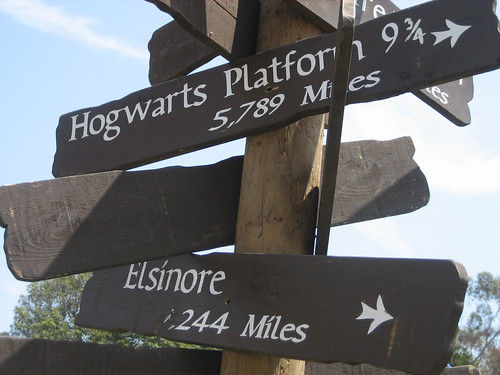 Image used under a Creative Commons license courtesy of Sarah Mae
Image used under a Creative Commons license courtesy of Sarah MaeAn op-ed by a high school senior in today's New York Times draws attention to a rather bizarre trend in higher-ed admissions - elite colleges trying to brand themselves as Hogwarts, the fictional school of Harry Potter fame. Setting aside the fact that yes, many of us probably did wish we could go to Hogwarts and learn a charm or two while reading those books as kids, this is a little weird. Lauren Edelston, a student in Portland weighing her college options, writes:
Yikes. I'd heard about student quidditch clubs showing up around the country, but not this kind of institutional embrace of pop culture as an admissions selling-point. And while I get that competition for the top applicants among elite schools is intense, one would imagine that the like of the Ivies would give their prospective students a little more credit. It all seems so childish. As Edelston points out, despite growing up enjoying the Harry Potter books, "what I enjoy in fiction I don’t necessarily want to find in college." Can you imagine showing up at Harvard, after working your ass off in high school, only to be mock-sorted into Hufflepuff?During a Harvard information session, the admissions officer compared the intramural sports competitions there to the Hogwarts House Cup. The tour guide told me that I wouldn’t be able to see the university’s huge freshman dining hall as it was closed for the day, but to just imagine Hogwarts’s Great Hall in its place.
At Dartmouth, a tour guide ushered my group past a large, wood-paneled room filled with comfortable chairs and mentioned the Hogwarts feel it was known for. At another liberal arts college, I heard that students had voted to name four buildings on campus after the four houses in Hogwarts: Gryffindor, Ravenclaw, Hufflepuff and Slytherin. Several colleges let it be known that Emma Watson, the actress who plays Hermione Granger in the movies, had looked into them. I read, in Cornell’s fall 2009 quarterly magazine, that a college admissions counseling Web site had counted Cornell among the five American colleges that have the most in common with Hogwarts. Both institutions, you see, are conveniently located outside cities. The article ended: “Bring your wand and broomstick, just in case.”
Over at The Quick and the Ed, Chad Alderman highlights the real problem - rather than marketing their diversity, these colleges and universities are falling over themselves trying to show how similar they are. Deciding on a college is an enormous decision, one I wish I had taken more seriously when I was 17. For a student like Edelston, who, by virtue of the schools she is visiting, is probably a smart and accomplished candidate, things like research facilities, student-teacher ratio, and financial aid ought to be bigger selling points than who has the most Hogwarts-esque library. You're making a choice that will guide your future, both socially and professionally, in any number of ways, not to mention a huge financial investment. And while a drunken quiddich game actually sounds like a pretty good time on campus, all Edelston seems to be asking for is a little respect. "After all," she concludes, "Harry Potter is frozen in high school, and we’re growing up."